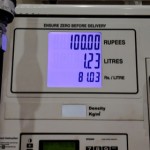On 5 May 2020, the Indian government imposed additional excise duty on diesel and petrol – pocketing the entire gain from the recent fall in international crude oil prices. International oil prices are currently $25-$30 per barrel, while consumers in India are paying $140 per barrel for diesel, and even more for petrol. Effectively, Indian consumers are paying $100 per barrel as taxes to central and state governments.
This may raise revenues for the government in the short run, but is not good policy.
First, India is trying to attract foreign investors, especially companies that are trying to move out of China. Shifting their operations to India will entail spending three to four times more on logistics and fuel. Why would any company do this? The high taxes on fuel in India are a clear disincentive.
Second, the existing high cost of logistics for industries already operating in the country, is one of the factors that makes India globally uncompetitive.
Third, in the past, the high prices of petrol and diesel compared to other products such as kerosene, have led to the adulteration of transport fuels with kerosene. This was a massive fuel mafia enterprise that eventually led to the murder of an Indian Oil excecutive in 2005. Artificially high fuel prices will revive such crimes.
Similarly with the tax on alcohol. The Delhi government has imposed a special 70% tax on liquor, which is an attempt to raise revenues during the pandemic. The fallout of this that the lower income group that cannot afford legal alcohol will simply resort to bootlegged, toxic, alcohol that kills many every year. The same problem arises with the tax on cigarettes. Very high taxes push people to consume harmful beedis and encourage the smuggling of cigarettes from Bangladesh and Nepal.
Additionally, due to high taxes on the import of the commodity, gold smuggling in India increasing as is evident from the growing seizure of gold by Indian customs. In the 1970s, a central character in many Bollywood movies used to be the gold smuggler who leveraged the sharp difference in gold prices between India and foreign countries to build his profitable crime syndicate. After the reduction in import taxes on gold in the 1990s, smuggling almost died out. However, in the past few years, it has seen a revival since the tax on importing gold has been raised to 12.5%. It’s easy money: 100 grams of gold brought in without paying tax is a smart gain of 12.5 grams of gold!
This short term approach to tax planning at this time of a health emergency, may bring in immediate revenues – but the long-term impact will only drive away business and encourage that bad old habit of tax evasion. Consistency in policies is a must for any government and India’s frequent and sharp revisions in tax rates, don’t convey consistency or inspire investment confidence.
Amit Bhandari is Fellow, Energy and Environment Studies Programme, Gateway House.
This blog was exclusively written for Gateway House: Indian Council on Global Relations. You can read more exclusive content here.
For interview requests with the author, or for permission to republish, please contact outreach@gatewayhouse.in
© Copyright 2020 Gateway House: Indian Council on Global Relations. All rights reserved. Any unauthorized copying or reproduction is strictly prohibited.


